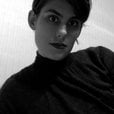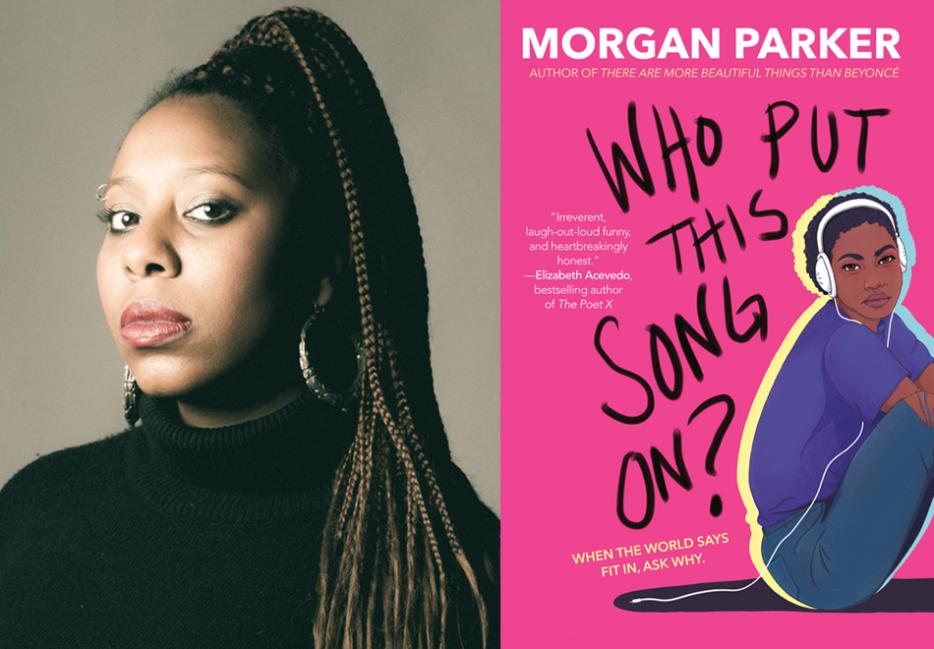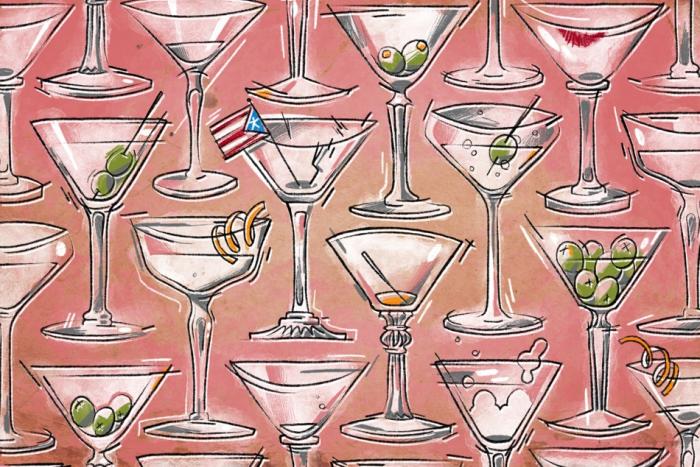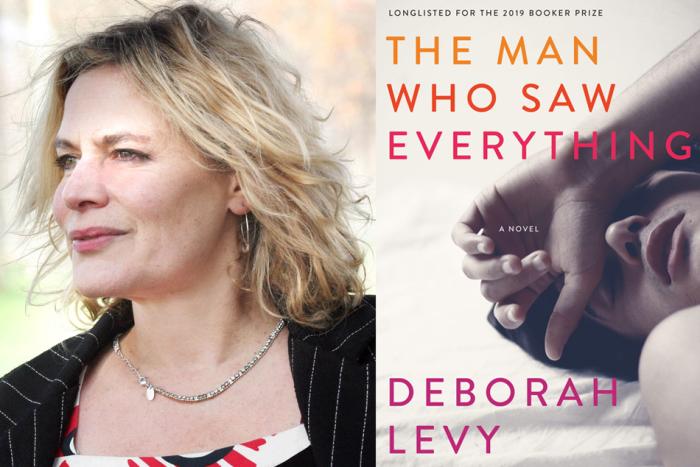Morgan Parker has published three poetry collections in a row to critical acclaim. Her debut, Other People's Comfort Keeps Me Up At Night, was selected by Eileen Myles as the winner of the 2013 Gatewood Prize. There are Things More Beautiful Than Beyoncé was named one of Time Magazine's best books of 2017. Magical Negro, published by Tin House earlier this year, has already received accolades from Vogue and the Washington Post. She's achieved the mainstream success so rare for poets, while refusing to gloss over the visceral experience of her verse. And so, while at the top of her literary game, she decided to do something different with her next book and publish a young adult novel.
Who Put This Song On? (Delacorte Press) follows a music-obsessed seventeen-year-old girl, also named Morgan Parker, trying to survive a semester of high school in her hyper-white Southern California town after the apex of a depressive episode. Though the novel takes a different form than Parker's previous work, the subject matter it tackles is familiar: the experience of existing as Black and female in white supremacist America, art and pop culture as an interactive experience, humour and trauma as close cousins.
Parker spoke to me on the phone from her home in LA, where she's been living after spending a decade in New York; she had a short break in between an extensive book tour. She is easygoing and quick to laugh at herself and at the process of writing this book, while also recognizing the gravity of her subject matter, and taking seriously the feelings of teen girls.
Anna Fitzpatrick: I've been aware of your work for years as a poet. Who Put This Song On? is obviously a departure from that. What was it like to transition from one format to a completely different one?
Morgan Parker: It was hard. [laughs] It was hard! I never took a fiction class. I had edited fiction books, so that was one thing, but it's very different to write fiction. I had to write a lot of drafts to figure out what the form could do for me, and to figure out how I wanted to use the form, and I guess to give myself permission to put my voice that I had developed in other forms into that rather than feeling like I'm not doing it right when it comes to figuring out plot points or structure or narrative. For me it was more exploring the form generally.
You play with the format, with diary entries and notebook entries throughout. Was writing in prose easier in any way?
[Pauses] No. [laughs] I mean, I love sentences, but they're so malleable and flexible. The thing about poems is, you can say a lot of things at once. With linear sentence structure you kind of can't do that, or you have to figure out ways to do that that aren't necessarily grammar or language based. That part is hard because I'm used to not being held to sentences. It feels very different to write something very plainly, to write, I don't know, "I want to die," rather than making a poem that essentially leads up to "I want to die." It's scarier, I think, and it was harder for me to develop these characters and to let go from the original story that I was starting from, and let the story that this book wanted to tell come out. It was more fun, often. I got to just make jokes, which was a departure—well, no, not really. But it was a different experience than writing humour into poetry. Being able to write in this voice of the main character was fun, and there was a little bit of levity involved in that, even though it was so vulnerable at the same time.
You're writing a character who shares so many biographical similarities to you and is also named Morgan Parker.
I didn't do that as a thing. Honestly, originally I was thinking about what to name her, and I feel like I was spending way too much time thinking about it. I really was stuck on that. I figured, maybe that's not the best way for me to spend my time when I have to write this whole book, so let me just put my name in as a placeholder. It just stayed. I wasn't expecting it to be part of the story, to have the character have my name, but it has been kind of a cool thing to talk about, and it is kind of an interesting way to interact with the reader, to take a step away from the fictional part and to speak directly to the reader. There's something, especially for a story like this that's dealing with suicidal ideation, I think it's kind of cool that the big thing about this book is that she survives. And having the character's name be my name, there's a little bit of hopefulness at that. It's not, "Here's this story about these people." It's, here's a real story, and, actually, the character lives on. But that's not stuff I was thinking about before the book was finished.
There are two afterwords to your book. One is a practical resource on how to find a therapist, but there's also one where you're addressing the reader directly, and you talk about how today you're thirty and thriving with this writing career. But you also talk about the ways in which your own high school experience was different. What was it like, revisiting high school but being able to control the narrative?
It was really emotional. I was doing it at the same time that I was moving across the country and back into my parents' house. I moved in with them before I found an apartment in LA. I was in my childhood bedroom writing the end of the book, having just done my decade in my New York, and returning home where everything's different. I used a lot of the diaries, and I spent a lot of time going back and just like, getting in the spirit of that time. It was really emotionally trying, and I was not kind to myself about it. But it did feel like, if I was going to write this story for young people, I needed it to not be how I remember it or looking back from the perspective of an adult. I really did need to go back to those things that I was writing in real time, and have a really deep understanding of what the feelings were. The actions, the plot points, the little stories that happened to the characters, those are the things that could be fictionalized, but the feelings part couldn't. That was something where I had to go direct to the source. It was really personally challenging coming to terms with who I was then, and forgiving that person and being ashamed of that person and loving that person. I had to go through all these different stages of interacting with that version of me, or that time in my life, and that changed so much throughout the writing of the book.
Morgan the character is younger than you, right? She's in high school in 2008.
Yeah, I was in college then.
Is there a reason why you bumped it up?
I really wanted to use the [2008 presidential] election as a catalyst in the book to explore race and politics and religion. I felt that was a really good way to show how this town this town reacts to all of those things. I wanted to play around with that. At the time I made that choice, it was toward the end of the Obama administration. It was kind of interesting in the writing to think about, what was life right before that? It was something that I felt worthy to be explored. It's not that long ago, but it still somehow feels like historical fiction or something. I think especially for kids that were a little bit too young at that time, it could be interesting to really think about how that election went. Like, we know what happens after. It's an interesting thing to look back at. I was in New York when Obama was elected, so I was in the streets at Columbia. Everyone was happy. But it wasn't like that in my hometown. I wanted to be able to show rather than tell what these folks's politics were and what they care about. Using the election allowed for that.
I was impressed by how hyper-specific the 2008 pop culture references were. I knew it was close to your own high school period, but certain album releases or TV episodes referenced—
Oh dude, I had to research! I had a list of months albums came out, so that I could actually try to be accurate about that. I couldn't just be like, "Oh I remember this album." I was literally like, "OK, what would they be listening to that's new." If they're listening to a new Death Cab album in September, how does that check out? Even just like, the movies that are playing, things like that. When was the Sarah Palin thing on SNL to make sure it's lining up with the school year. It was kind of fun, but it was weirdly a lot to keep track of. I had two calendars at the time, one for the book and one for my life. It really got—for the most part it was like, "OK, homecoming is not for me, that's the other Morgan Parker." But there was one day where it said, "Morgan-therapy," and I was like, "Wait, I don't have therapy on Fridays?" I would get them confused. Holding both of those worlds in my head at the same time was funny.
Did you revisit a lot of the music and things from your own high school years when you were working on this?
Oh, yeah. When I finished I was like, "Thank goodness I can listen to something else." I made a playlist for the book, but I also have like a way longer one that I would just throw on while I was writing. It was all of the stuff. [laughs] Like, all of the stuff. The corny stuff to the deeply sad to what we would listen to in the car to what I would listen to in my bedroom crying. So, I had this huge running playlist that I would listen to as I was writing, which was intense. I was very much in a particular time and mood. It was really interesting to just sit there for quite a while. [dog yaps in background] Shirley! Come! Sorry. That's my dog.
All the musical references had this cinematic sense, the way that in movies and TV shows the composer will give certain characters their own musical cues. You have the specific emo Morgan listens to, and she calls out her best friend for listening to "fake emo." Good Charlotte and stuff. And her therapist likes Bon Jovi, and she gets two different boys making her mixes which are similar but—
But not. It's so interesting getting reception about the book because you don't hear enough from young people. You hear a lot from older middle aged white women. They're all just like, "I didn't recognize the references!" or "Who makes mixed CDs in 2008?" All of that stuff is like, Dude, get out of the way. We know. Anyone reading that who has ever felt, not only if you've been into emo music but if you've understood the importance of music as a teenager and the significance of mixed CDs, you're going to be looking at that and saying, "Oh, I can see how they're kind of different, kind of the same," you know? And that is important and notable. That is something that is really steeped in that time and that age. It's been funny, because I'm like, you maybe don't remember, but this was serious. And I'm pretty sure folks can relate to that.
I've got mixed CDs from 2008 with TV On The Radio and Sonic Youth and some of the exact track listings that she has. Certain voices really do dominate YA conversations online. But the teens are still out there reading them.
It's true. It's true! They're there.
They're just not making as much noise.
Exactly.
Who are you hoping finds this book?
Honestly... obviously, I'm putting this out there for some people, and part of that is, I needed this book so desperately. Like I said, it was super hard to write this, and the reason I finished was because I needed to do it for age-fifteen Morgan Parker because I didn't have that. To be able to have the power to make that thing, to correct that lack in my life, is an honour. I don't know. It felt kind of healing in a way. Not just to give it to teens now who are feeling the same way, but also for those of us who didn't have that and still need it in a lot of ways, whether or not we've moved past that time in our lives. We still need that representation and encouragement and validation. So first and foremost, teens that are struggling with mental health, or struggling with feeling isolated. Struggling with racism, with their identity and how they feel about themselves, and all of that. Specifically Black girls. It's so interesting because my books are really hyper-specific, and I want them to find those specific—like, someone in my hometown who is wearing Doc Martens and listens to Sonic Youth and has depression. But there's a kind of wider net that grows from that. Generally, I want it to find those specific folks, but I also want it to find people who feel alone and isolated and confused and not powerful. I also want adults who have been through that and who maybe didn't have the kind of support they needed. And lastly, parents and friends of people who are feeling alone and who are feeling afraid of what is next. Part of writing this book has been sharing something that nobody really knew around me. In the book she writes a piece for the yearbook, and that's what I did. When I published it, it was my senior yearbook, I was like, "I'm moving across the country, who cares." But one thing that I found is that people were so shocked. They were like, "Oh my god, I never would have guessed, you're always laughing, you get straight As." And that was... hurtful, you know? Like, damn, really no one saw this and no one knew how to see it because everyone's just expecting depression to equal crying uncontrollably and that's just the way it looks. Another part of this book is just showing what depression looks like for real, and the many forms that it can take, just so that people are aware and people can pay attention and not be dismissive and be understanding. I think to be able to give credit to those feelings is important to me.
One last thing I wanted to ask you was, again, because I knew your work first as a poet, there's this running bit in the book where teenage Morgan just hates poetry. Was that an accurate reflection of your high school self, or—
Yup. I honestly did not like poetry. At all. I hated it. And it was because they were giving us poems about cabins and the earth or whatever. To be able to put that in was actually really fun for me. People always laugh if they know. It's also a dig, because I have three poetry books now. I almost did not write poetry because of the educational system. Little things like that were cool to write in because like, "Damn, even she hated it." I didn't get into writing poetry until halfway through college and I wasn't even taking it serious at that time. I'm weirdly kind of new to poetry.






